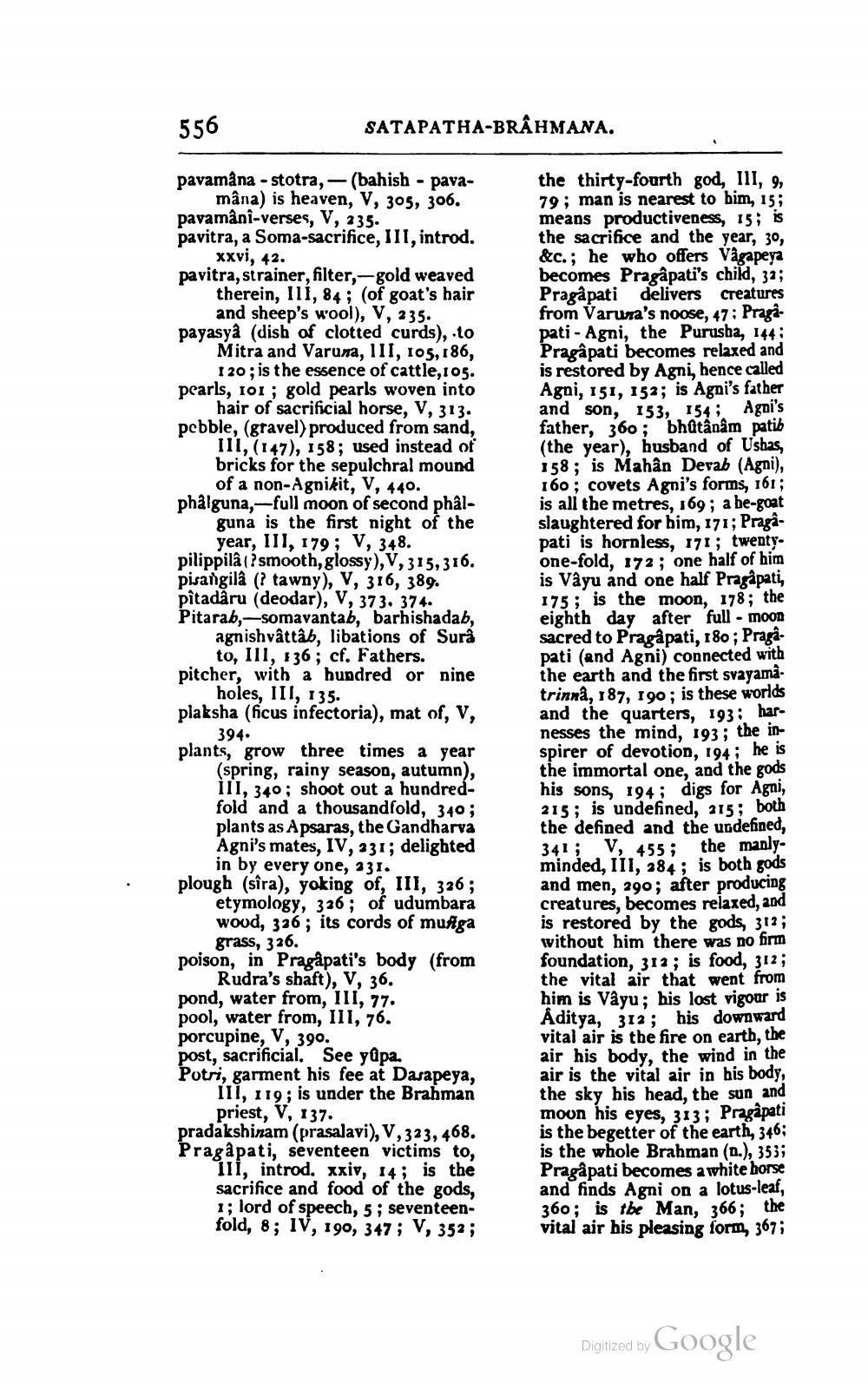________________
556
SATAPATHA-BRAHMANA.
eep's
clotte vil, itle
pavamâna - stotra, - (bahish - pava
mâna) is heaven, V, 305, 306. pavamâni-verses, V, 235. pavitra, a Soma-sacrifice, 111, introd.
xxvi, 42. pavitra, strainer, filter,-gold weaved
therein, 111, 84 ; (of goat's hair
and sheep's wool), V, 235. payasyà (dish of clotted curds), .to
Mitra and Varuna, III, 105, 186,
120; is the essence of cattle,105. pearls, 101 ; gold pearls woven into
hair of sacrificial horse, V, 313. pebble, (gravel) produced from sand,
III, (147), 158; used instead of bricks for the sepulchral mound
of a non-Agnikit, V, 440. phålguna,-full moon of second phâl
guna is the first night of the
year, III, 179; V, 348. pilippila i smooth, glossy), V, 315, 316. pisangilâ (7 tawny), V, 316, 389. pitadaru (deodar), V, 373, 374. Pitarab, --somavantab, barhishadab,
agnishvâttâb, libations of Surå
to, III, 136; cf. Fathers. pitcher, with a hundred or nine
holes, III, 135. plaksha (ficus infectoria), mat of, V,
394. plants, grow three times a year
(spring, rainy season, autumn), III, 340 ; shoot out a hundredfold and a thousandfold, 340; plants as Apsaras, the Gandharva Agni's mates, IV, 231; delighted
in by every one, 231. plough (sîra), yoking of, III, 326;
etymology, 336; of udumbara wood, 326; its cords of mugga
grass, 326. poison, in Pragàpati's body (from
Rudra's shaft), V, 36. pond, water from, III, 77. pool, water from, III, 76. porcupine, V, 390. post, sacrificial, See yüpa. Potri, garment his fee at Dasapeya,
, 119; is under the Brahman priest, V, 137. pradakshinam (prasalavi), V, 323, 468. Pragâ pati, seventeen victims to,
III, introd. xxiv, 14; is the sacrifice and food of the gods, 1; lord of speech, 5; seventeenfold, 8; IV, 190, 347; V, 352;
the thirty-fourth god, III, 9, 79; man is nearest to bim, 15; means productiveness, 15; is the sacrifice and the year, 30, &c.; he who offers Vågapeya becomes Pragâpati's child, 32; Pragapati delivers creatures from Varuna's noose, 47: Pragapati - Agni, the Purusha, 144: Pragâpati becomes relaxed and is restored by Agni, hence called Agni, 151, 152; is Agni's father and son, 153, 154; Agni's father, 360 ; bhätânâm patib (the year), husband of Ushas, 158; is Mahân Derab (Agni), 160; covets Agni's forms, 161; is all the metres, 169; a be-goat slaughtered for him, 171; Pragapati is hornless, 171; twentyone-fold, 172 ; one half of him is Vâyu and one half Pragapati, 175; is the moon, 178; the eighth day after full - moon sacred to Pragapati, 180; Pragapati (and Agni) connected with the earth and the first svayamatrinnå, 187, 190; is these worlds and the quarters, 193; harnesses the mind, 193; the inspirer of devotion, 194; he is the immortal one, and the gods his sons, 194; digs for Agni, 215; is undefined, 215; both the defined and the undefined, 341; V, 455; the manlyminded, III, 284; is both gods and men, 290; after producing creatures, becomes relaxed, and is restored by the gods, 312; without him there was no firm foundation, 312; is food, 312; the vital air that went from him is Vayu; his lost vigour is Aditya, 312; his downward vital air is the fire on earth, the air his body, the wind in the air is the vital air in his body, the sky his head, the sun and moon his eyes, 313; Pragapati is the begetter of the earth, 346; is the whole Brahman (n.), 353; Pragå pati becomes a white horse and finds Agni on a lotus-leaf, 360; is the Man, 366; the vital air his pleasing form, 367;
WEIH
Digitized by Google




